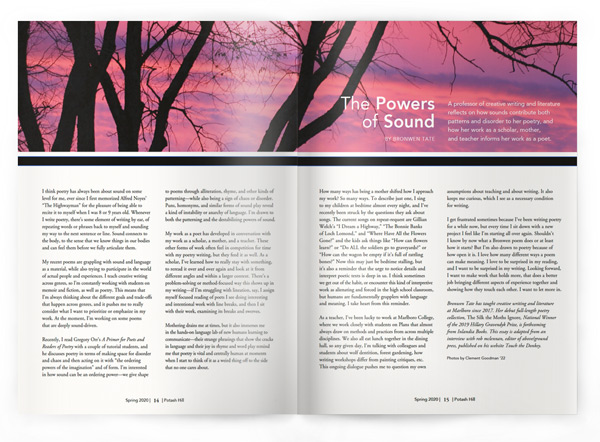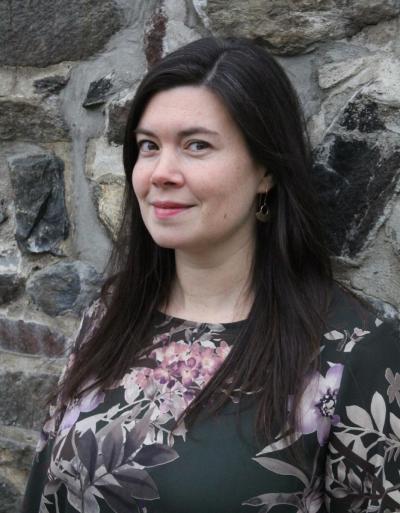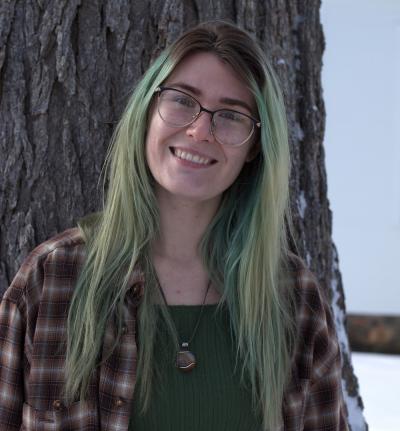The Powers of Sound

By Bronwen Tate
 A professor of creative writing and literature reflects on how sounds contribute both patterns and disorder to her poetry, and how her work as a scholar, mother, and teacher informs her work as a poet.
A professor of creative writing and literature reflects on how sounds contribute both patterns and disorder to her poetry, and how her work as a scholar, mother, and teacher informs her work as a poet.
I think poetry has always been about sound on some level for me, ever since I first memorized Alfred Noyes’ “The Highwayman” for the pleasure of being able to recite it to myself when I was 8 or 9 years old. Whenever I write poetry, there’s some element of writing by ear, of repeating words or phrases back to myself and sounding my way to the next sentence or line. Sound connects to the body, to the sense that we know things in our bodies and can feel them before we fully articulate them.
My recent poems are grappling with sound and language as a material, while also trying to participate in the world of actual people and experiences. I teach creative writing across genres, so I’m constantly working with students on memoir and fiction, as well as poetry. This means that I’m always thinking about the different goals and trade-offs that happen across genres, and it pushes me to really consider what I want to prioritize or emphasize in my work. At the moment, I’m working on some poems that are deeply sound-driven.
Recently, I read Gregory Orr’s A Primer for Poets and Readers of Poetry with a couple of tutorial students, and he discusses poetry in terms of making space for disorder and chaos and then acting on it with “the ordering powers of the imagination” and of form. I’m interested in how sound can be an ordering power—we give shape to poems through alliteration, rhyme, and other kinds of patterning—while also being a sign of chaos or disorder. Puns, homonyms, and similar forms of sound play reveal a kind of instability or anarchy of language. I’m drawn to both the patterning and the destabilizing powers of sound.
My work as a poet has developed in conversation with my work as a scholar, a mother, and a teacher. These other forms of work often feel in competition for time with my poetry writing, but they feed it as well. As a scholar, I’ve learned how to really stay with something, to reread it over and over again and look at it from different angles and within a larger context. There’s a problem-solving or method-focused way this shows up in my writing—if I’m struggling with lineation, say, I assign myself focused reading of poets I see doing interesting and intentional work with line breaks, and then I sit with their work, examining its breaks and swerves.
Mothering drains me at times, but it also immerses me in the hands-on language lab of new humans learning to communicate—their strange phrasings that show the cracks in language and their joy in rhyme and word play remind me that poetry is vital and centrally human at moments when I start to think of it as a weird thing off to the side that no one cares about.
How many ways has being a mother shifted how I approach my work? So many ways. To describe just one, I sing to my children at bedtime almost every night, and I’ve recently been struck by the questions they ask about songs. The current songs on repeat-request are Gillian Welch’s “I Dream a Highway,” “The Bonnie Banks of Loch Lomond,” and “Where Have All the Flowers Gone?” and the kids ask things like “How can flowers learn?” or “Do ALL the soldiers go to graveyards?” or “How can the wagon be empty if it’s full of rattling bones?” Now this may just be bedtime stalling, but it’s also a reminder that the urge to notice details and interpret poetic texts is deep in us. I think sometimes we get out of the habit, or encounter this kind of interpretive work as alienating and forced in the high school classroom, but humans are fundamentally grapplers with language and meaning. I take heart from this reminder.
As a teacher, I’ve been lucky to work at Marlboro College, where we work closely with students on Plans that almost always draw on methods and practices from across multiple disciplines. We also all eat lunch together in the dining hall, so any given day, I’m talking with colleagues and students about wolf dentition, forest gardening, how writing workshops differ from painting critiques, etc. This ongoing dialogue pushes me to question my own assumptions about teaching and about writing. It also keeps me curious, which I see as a necessary condition for writing.
I get frustrated sometimes because I’ve been writing poetry for a while now, but every time I sit down with a new project I feel like I’m starting all over again. Shouldn’t I know by now what a Bronwen poem does or at least how it starts? But I’m also drawn to poetry because of how open it is. I love how many different ways a poem can make meaning. I love to be surprised in my reading, and I want to be surprised in my writing. Looking forward, I want to make work that holds more, that does a better job bringing different aspects of experience together and showing how they touch each other. I want to let more in.
Bronwen Tate has taught creative writing and literature at Marlboro since 2017. Her debut full-length poetry collection, The Silk the Moths Ignore, National Winner of the 2019 Hillary Gravendyk Prize, is forthcoming from Inlandia Books. This essay is adapted from an interview with rob mclennan, editor of above/ground press, published on his website Touch the Donkey. Photos by Clement Goodman ’22
Poetry by Bronwen Tate
Reproductions of Frescoes
 Travel back. Because of a misstep, I saw a crevice in a horse’s
Travel back. Because of a misstep, I saw a crevice in a horse’s
knee in place of brigands. Play of light and color off their helms.
Reading in the original French. Reading to be elsewhere. I look
past it, first conception.
I read Proust. In wide-sleeved houppelande, she incarnates.
Swollen fruit of her manly form a solid allusion. Prod that
membrane edged with ribbons of watercress or cuckoo flower.
For each word, a word in another language means part of the
same thing. When I look up “midwife” on the university website,
the only reference is to Plato. Theaetetus, he suggests, is in discomfort
because he is in intellectual labour.
I want to be a scholar. I want a new vernacular of milk.
Echo, echo, on my perch with my library. Well-stocked dictionary
sends me Latin, lygeum spartum, cultivated or not present here.
I Could Not Ask Other Flowers
Today multiplied.
A layered wealth of strata along the sloped face of the work. Ankle
bone, wind-blown grain, suck of honeysuckle, cell of honeycomb.
Approach the hedgerow with reverence due a rood loft (consent,
oh Lord, to bless). Spade in hand, cleave what knotted. I am
of the same stripe as she who cries into the thorned canopy. I
follow her gaze to the engraved steeple, bricked with birds’ nests.
Talus, alveolus, speak the landscape of a body. Thoughts pile
up, bent, twined, twisted as flowers.
Circumstances Legible Behind This Window
What is raw in me again, burst blister, lamb’s lettuce.
Fixed to hang on syllables, frivolous and drowsing. All modifiers
are contagious. Complacent. Glowing. All modifiers slip me in
the direction of the sea.
Without the residue of fixed habits, I loosen my gauge to make
sweet the absences. Lace is made of holes. Like a bassinet on a
lower step, my hum rocks side to side. Water diminishes in the
basin as the days grow drier. I say guard and mean keep.
To Hold What’s Tender
Baby bathes
My lip bruised
from his hard crown
Lean down
his palm along my cheek
repeating “gentle”
hurts a little
Bruised Peaches
We measure days in peaches, bruises, livid, lose the keys
Find them days later in the dirty laundry. What is habit
That it wakes me up to effort? I cook but don’t dust, read
In bed, wash the sheets occasionally. Eat the peaches
Before they mold, wear wool socks against a cold July.
My signature slants “O” to a recognizable angle—what is
Unnoticed is unchanging; the B negative of my blood, unchecked,
Will reject babies that could have poisoned me in another age.
Might effort tilt the ratios of my articles, definite stamp of
All I’ve heard and hardened indefinite in what I make. A child is
Variable flung from the cells, being, substance-sewn
Self. In coming hours, a turn, determined angle, harkening,
Effortless. Biology wakes me to that cry. Subterranean
Singing through the fabric, thin-spread-thing, I am still here.
Umbilical
Blue umbilical pulse to cut, my last placenta
Stuck, the doctor scrubbed elbow-deep, that flesh
Suddenly neither of us, excess, would rot inside me.
I held him, purple still and scrawny, bawling.
Hot blankets, shivering, sweat-wracked, hormone high—
What is in the body, yours, mind, all mouth? We are
Our parts, not a self apart, grow new ancillaries, collaborate
On blood. My son nears three now, swipes and taps
Glass-faced watch-hands, asks if the umbilicus plugs
Into the wall, charged up on Coca-Cola, wails, “hard peaches
Are my favorite.” He wants what’s unripe. I slice and macerate
With sweet and salt and mint, tired now beyond cheek’s fuzz
And bloom. New one, I made you a room inside my mind.
Still you’ll split my skin to quit me.
“Reproduction of Frescos,” “I Could Not Ask Other Flowers,” and “Circumstances Legible Behind This Window,” were previously published in Touch the Donkey, #21.
The Inadequacy of Words
 “Memory, like a good poem, can be returned to again and again, yielding new meanings from new angles,” says Brooke Evans ’19, who completed their Plan in writing in December. “When we write, we hold each memory in our hands, turn it, see past and present overlap.” The main component of Brooke’s Plan blends poetry and prose in a nonlinear, braided life-writing piece titled “As I Left It,” where prose rooted in childhood memories weaves into poetic forms that seek to collect and connect fragments. Their original works are supported by an essay reflecting on C.D. Wright’s idiosyncratic style and influence on their own experimental explorations. “What drew me to experiment with form and outside of conventional forms in my poetry and prose was the inadequacy of words alone to convey what I aim to express.”
“Memory, like a good poem, can be returned to again and again, yielding new meanings from new angles,” says Brooke Evans ’19, who completed their Plan in writing in December. “When we write, we hold each memory in our hands, turn it, see past and present overlap.” The main component of Brooke’s Plan blends poetry and prose in a nonlinear, braided life-writing piece titled “As I Left It,” where prose rooted in childhood memories weaves into poetic forms that seek to collect and connect fragments. Their original works are supported by an essay reflecting on C.D. Wright’s idiosyncratic style and influence on their own experimental explorations. “What drew me to experiment with form and outside of conventional forms in my poetry and prose was the inadequacy of words alone to convey what I aim to express.”
